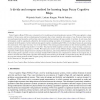Free Online Productivity Tools
i2Speak
i2Symbol
i2OCR
iTex2Img
iWeb2Print
iWeb2Shot
i2Type
iPdf2Split
iPdf2Merge
i2Bopomofo
i2Arabic
i2Style
i2Image
i2PDF
iLatex2Rtf
Sci2ools
128
Voted
FSS
2010
2010
A divide and conquer method for learning large Fuzzy Cognitive Maps
Fuzzy Cognitive Maps (FCMs) are a convenient tool for modeling and simulating dynamic systems. FCMs were applied in a large number of diverse areas and have already gained momentum due to their simplicity and easiness of use. However, these models are usually generated manually, and thus they cannot be applied when dealing with large number of variables. In such cases, their development could be significantly affected by the limited knowledge and skills of the designer. In the past few years we have witnessed the development of several methods that support experts in establishing the FCMs or even replace humans by automating the construction of the maps from data. One of the problems of the existing automated methods is their limited scalability, which results in inability to handle large number of variables. The proposed method applies a divide and conquer strategy to speed up a recently proposed genetic optimization of FCMs. We empirically contrast several different designs, includ...
FCMs | FSS 2010 | Fuzzy Cognitive Maps | Large Number |
| Added | 25 Jan 2011 |
| Updated | 25 Jan 2011 |
| Type | Journal |
| Year | 2010 |
| Where | FSS |
| Authors | Wojciech Stach, Lukasz A. Kurgan, Witold Pedrycz |
Comments (0)

